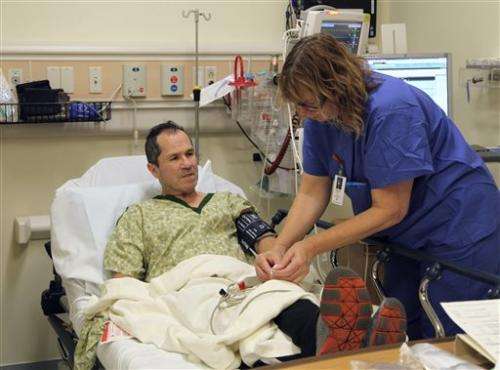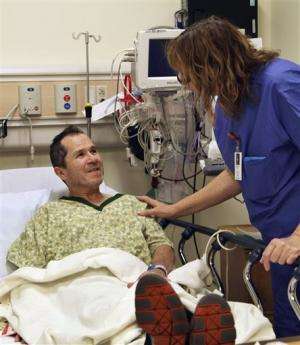Culturally sensitive palliative care represents new approach

When doctors diagnosed Pilar Alcantara with advanced breast cancer, she felt lost and intimidated.
Growing up in Mexico, she learned to deal with illnesses using home remedies and prayer. She was taught that doctors weren't to be questioned, and she preferred not to know the details of her illnesses or treatment plans.
She felt hopeless, but that was before she connected with a Portland, Oregon-based nonprofit that takes cultural habits and beliefs into account while focusing on comfort and quality of life for patients with serious or terminal illnesses. She said the approach saved her.
"A few years ago, because of the pain and uncertainty, I wanted to bail on life," Alcantara said. "Palliative care gave me more control over my cancer."
Palliative care, which focuses on the well-being of patients with serious illnesses by improving doctor-patient communication and treating pain and side effects, has gained traction across the nation, but the culturally sensitive model embraced by Familias en Accion, the treatment center that has helped Alcantara, represents a new approach.
The method has taken root in Portland and Seattle, and it's being taught to nursing students in California for its potential to improve care and reduce costs. Dr. Woody English, former medical director of palliative care at Providence Health and Services in Portland, said the multi-faceted approach "has the ability to transform the usual health care system."
Studies show palliative care decreases emotional and medical crises and cuts down on unnecessary emergency room trips and hospitalizations, leading to cost savings sought under the Affordable Care Act. "A patient who is not having a crisis does not call 911," Dr. Diane Meier, director of the Center to Advance Palliative Care, said.
By adding a cultural emphasis, health care professionals aim to address patient needs that would otherwise be overlooked. "Until we understand a patient's drivers and concerns—the social, emotional, religious and historical contexts—we can't begin to help the person," and help them, Meier said.

Familias started its program in 2011 with a $260,000 grant from the Portland-based Cambia Health Foundation. The system involves patient navigators who help chronically ill Latinos access doctors, fill out insurance forms and find financial assistance. Familias also offers support groups and health literacy sessions to help ease stress, stabilize emotions and address cultural factors that might hinder care.
At the outset, the group tracked 90 seriously ill patients for two years and showed a 62 percent reduction in inpatient, outpatient and ER costs.
Among those who received help from Familias was Crispin Lopez Serrano, a liver cancer patient who had resigned himself to fate and faith. The 58-year-old suburban Portland resident had lost his private health insurance when his illness made him unable to work construction.
"I was just going to get by with the grace of God, eating aloe and drinking herbal teas," Lopez Serrano said.
A Familias navigator, however, helped him sign up for Medicaid and retain his same doctors. The support groups restored his hope and let him know he wasn't alone. Getting to know other Latinos who were fighting serious illnesses "motivated me to live," he said.
Advocates want such programs expanded to help the increasing population of aging minorities, and the approach has popped up in spots around the U.S.
At Harborview Medical Center in Seattle, where the foreign-born population has increased 40 percent over the past decade, culturally specific palliative care programs have been created for immigrants from Mexico, Somalia, Vietnam and elsewhere.
And, citing a need for growth, California State University's Institute for Palliative Care has begun offering an online course that hones in on the needs of Latino patients.
The programs help break down barriers that traditional care models miss, gaps that can lead to improper diagnoses and poor treatment.
"Being culturally competent means you know where people come from, their values, and you take an extra step to go toward where they are," Olga Gerberg, director of patient navigators at Familias, said. "You need to address the mentality of the person's approach to illness."
In Alcantara's case, the organization radically changed her approach by encouraging her to educate herself about different types of treatments and teaching her how to discuss them with her doctor.
With the help of her patient navigator, the 45-year-old found a new oncologist and decided against chemotherapy, instead choosing a less taxing treatment that allows more time with her two children. She now volunteers as a patient navigator, helping other Latinos. She says there's a need, since others likely face treatment barriers similar to her own.
Growing up, "health was just not so important," she said, explaining an obstacle that she once faced. "It wasn't something you discussed openly. If there were problems, you fixed it yourself."
© 2015 The Associated Press. All rights reserved.
















